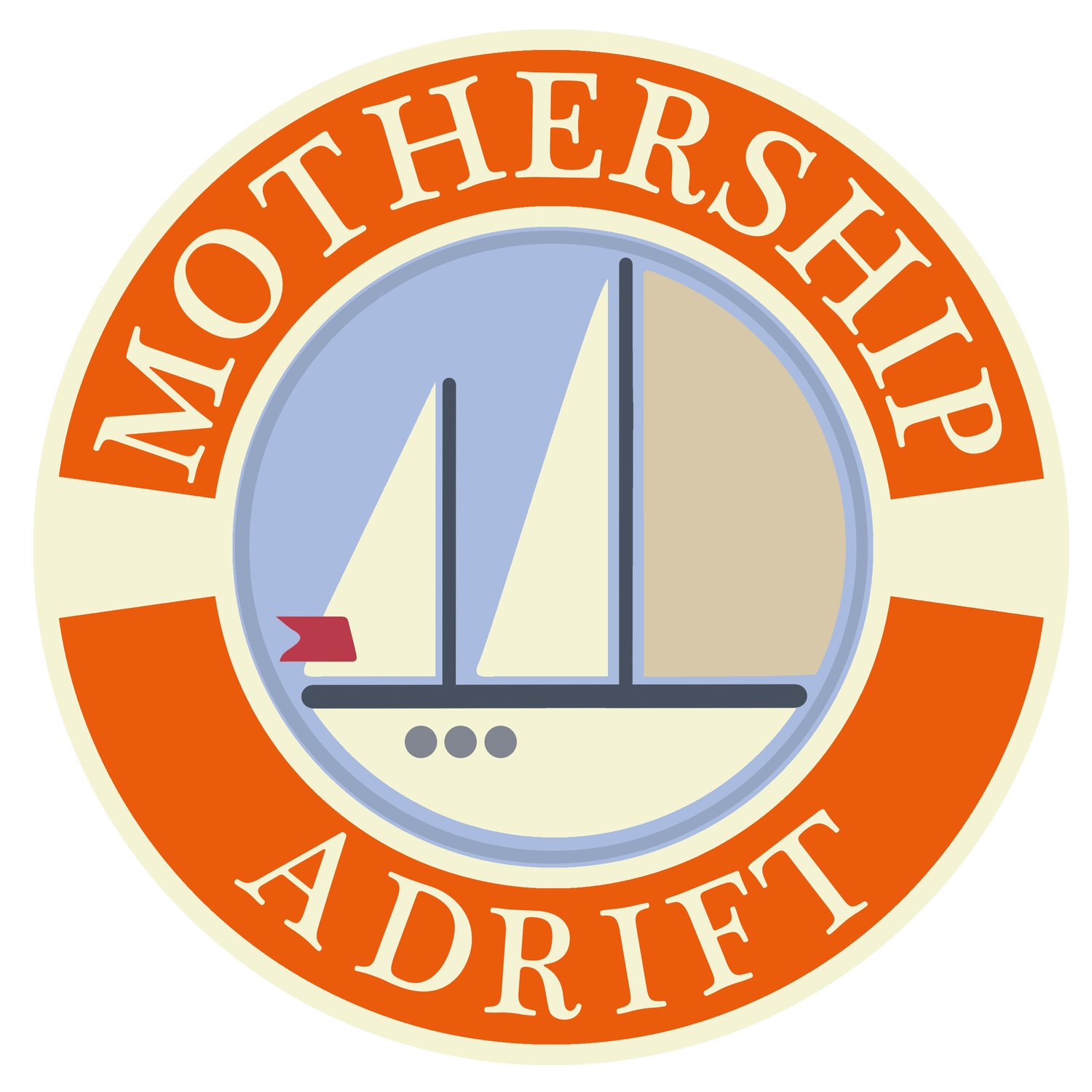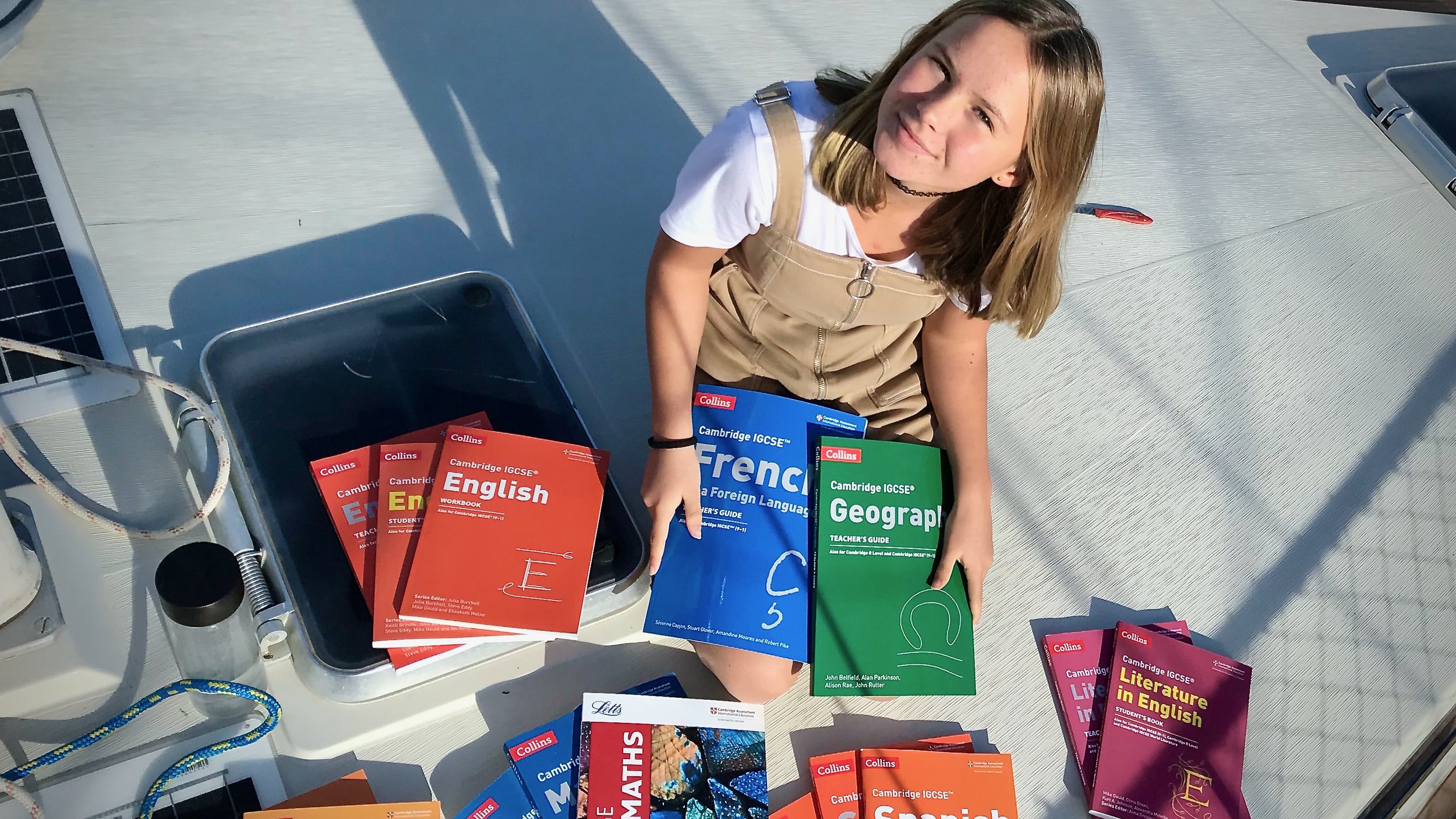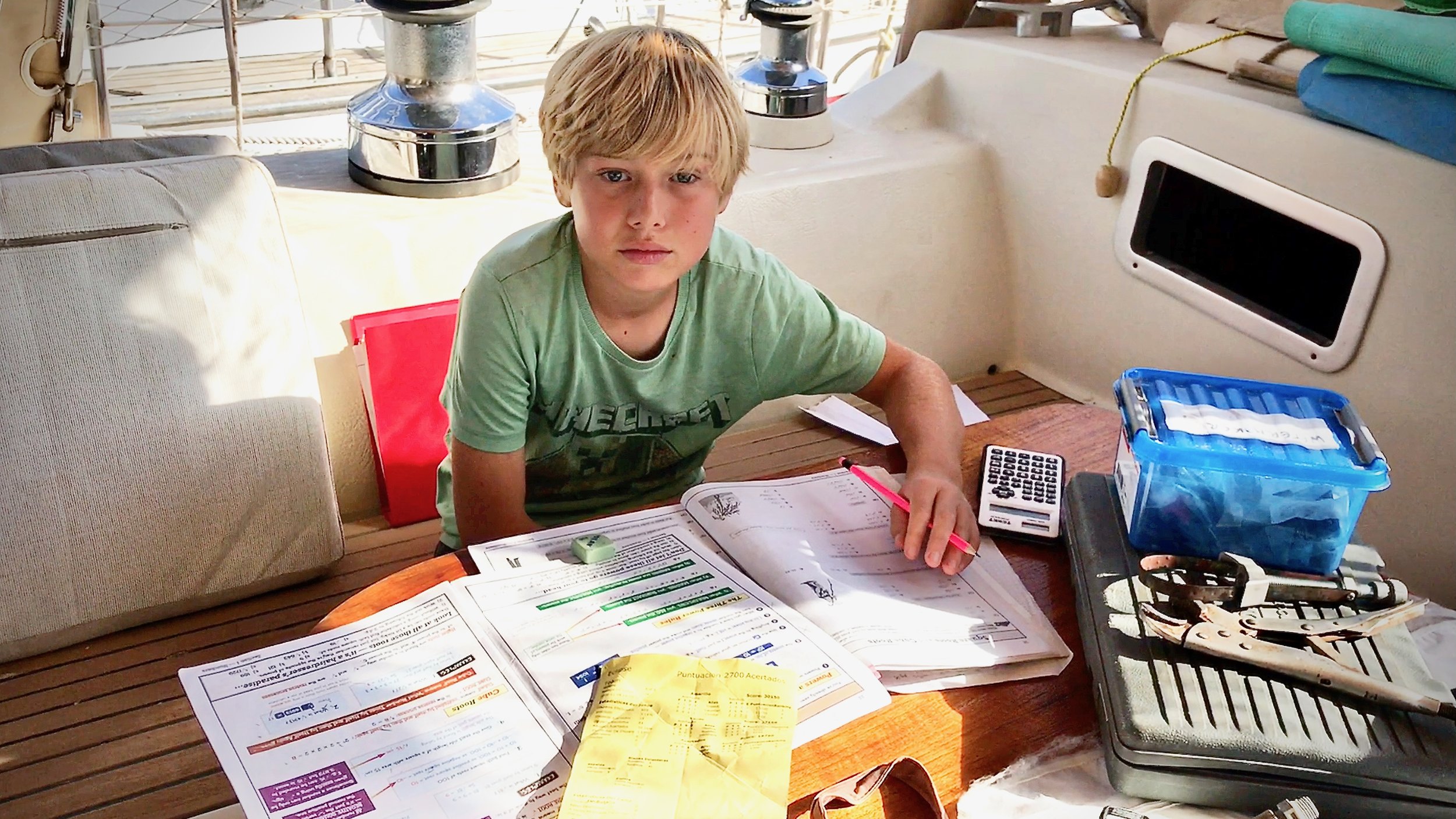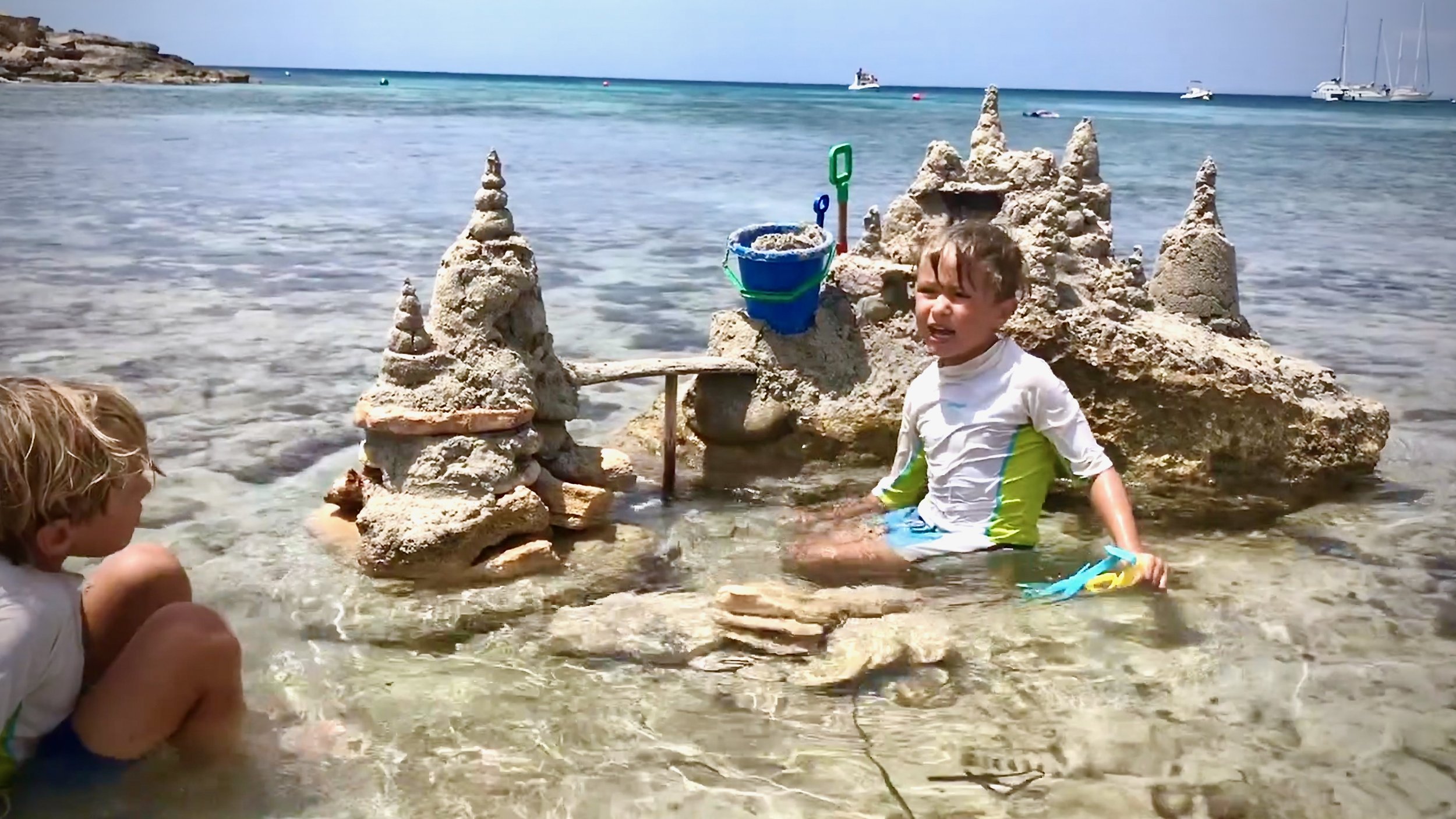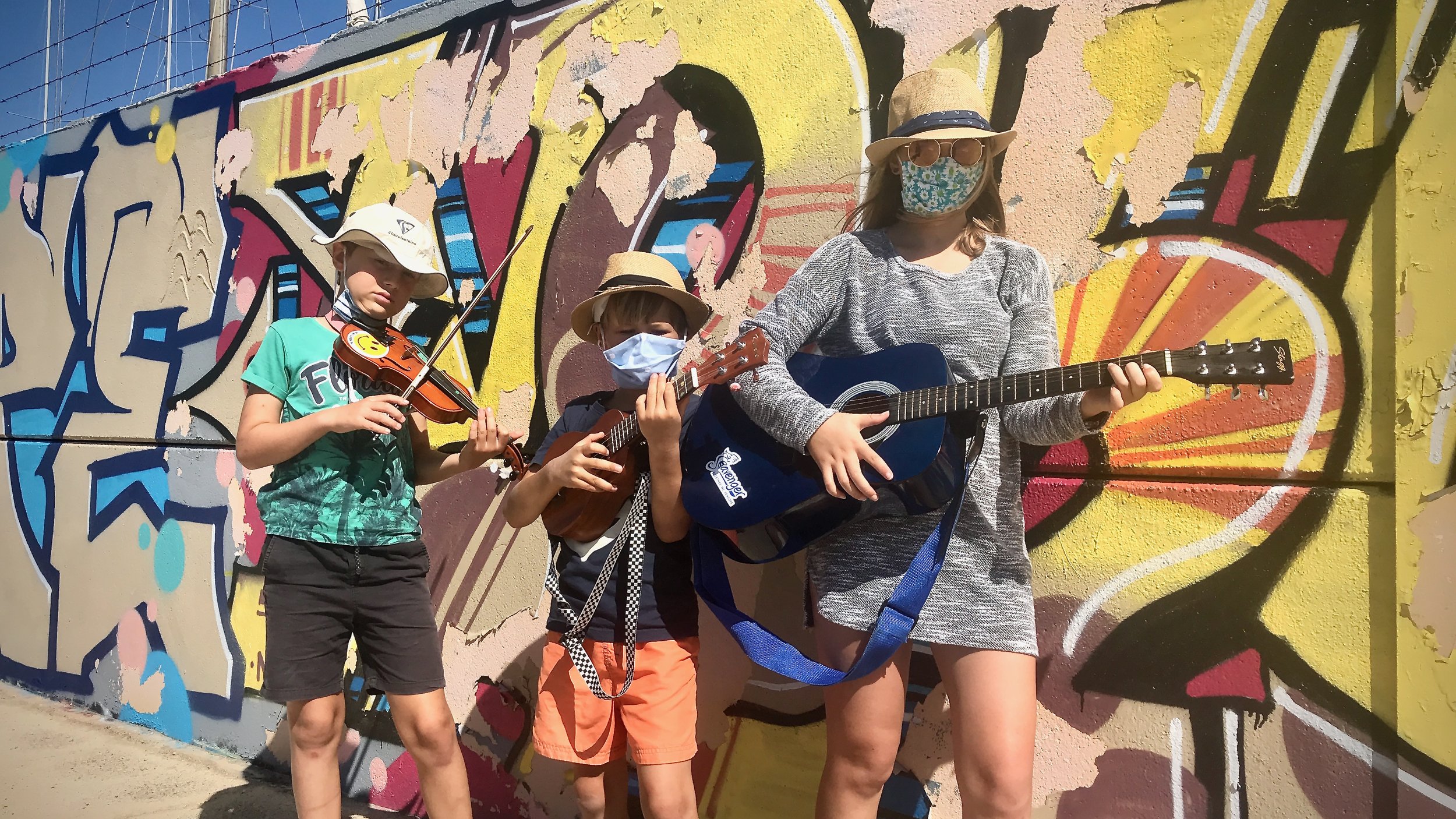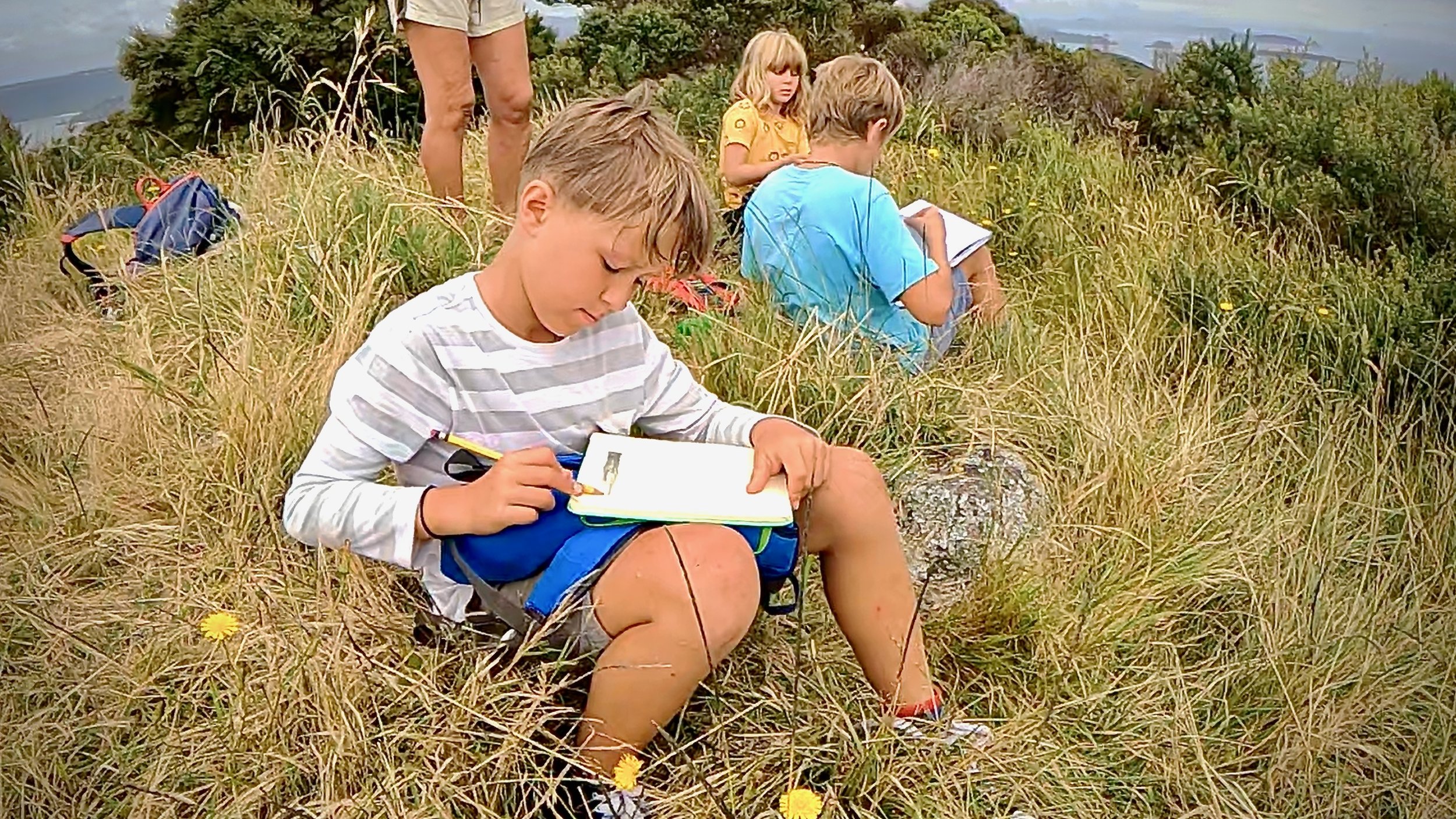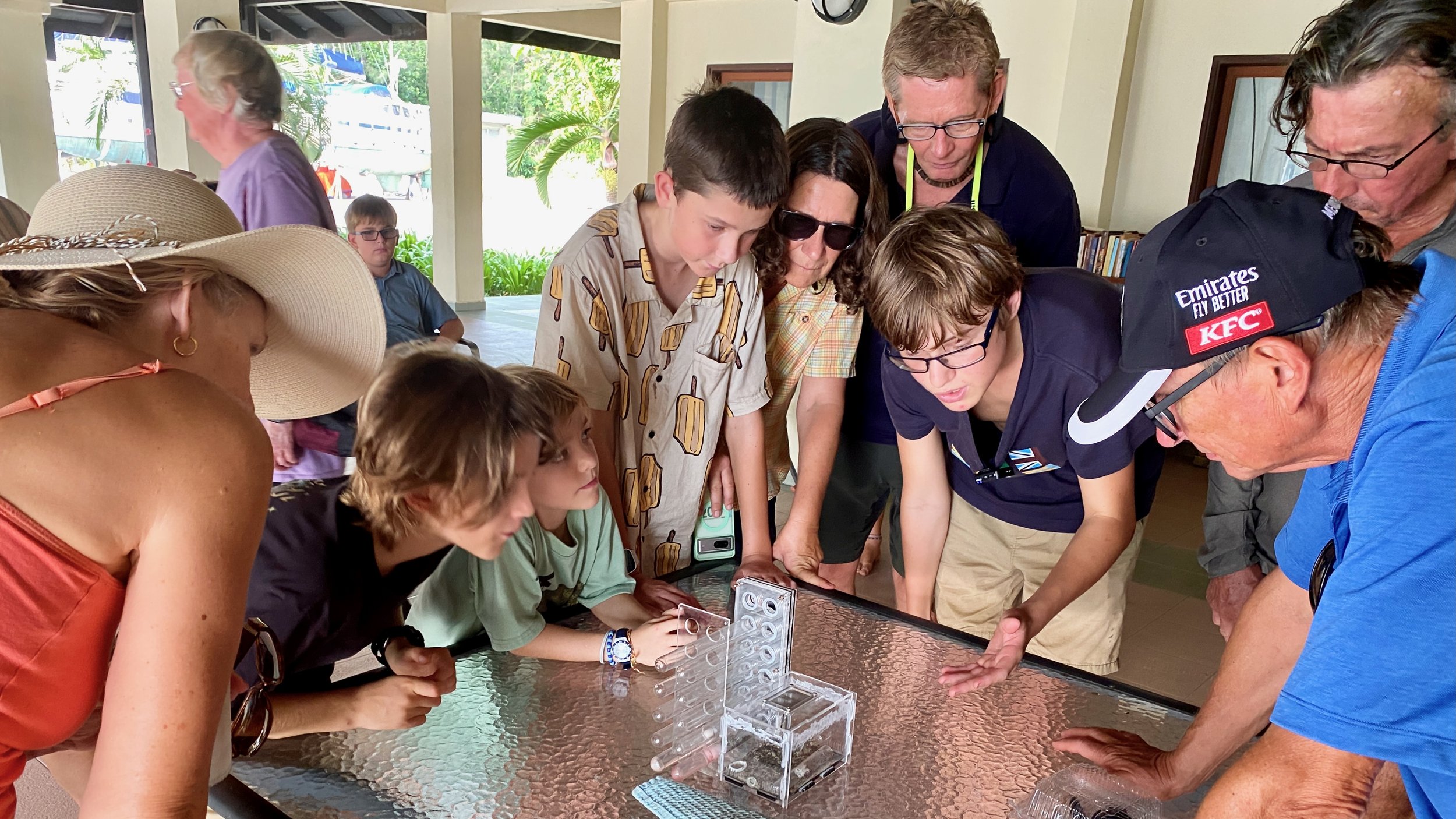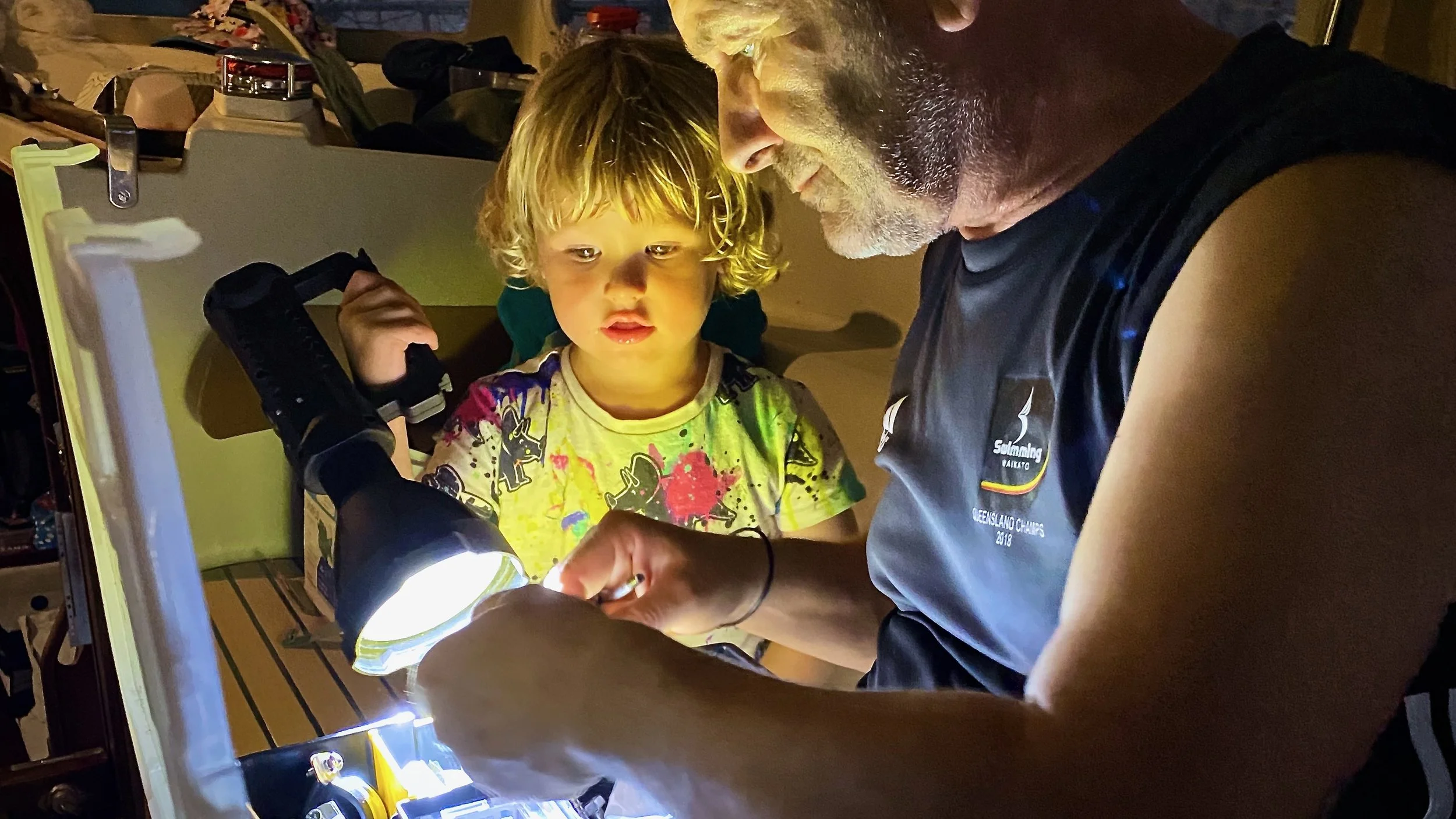Boat-Schooling: A Parent’s Guide to Creating (or Ditching!) a Classroom at Sea
01-04-06
“It is possible for a man to know something without having been at school as it to have been at school and know nothing”
The One Big Fear That Nearly Kept Us Ashore
Yewan being inspired by beach art. Ithica Island, Greece
If anything could have persuaded us not to make our great escape, it would have been our children’s education. We agonised over it—before we left, and for years afterwards. The idea of abandoning the comforting rigidity of public schooling, with its universal standards and tidy checklists, was frankly terrifying.
Our Early (Failed) Attempt at Floating School
So, naturally, we did what any nervous parent would: we tried to replicate a traditional school on board. Timetables. Curriculum. Structure. Ring a bell, hand out worksheets, pretend the galley was a classroom. And for a while, it worked. The novelty of being educated on a boat was exciting enough to paper over the cracks.
But novelty, like fair winds, doesn’t last forever. Ocean passages. Engine repairs. Meet-ups. Storms. Dinghy trips ashore. “Let’s just pop over to that other family boat and say hi” turned into an entire afternoon. Our tidy timetable quickly became more of a museum piece than a working document. It felt like trying to cram a square peg into a round porthole.
We tried to replicate a traditional school on board. Timetables. Curriculum. Structure. Almerimar, Spain.
The Parent-Teacher Mutiny
If you attempted to homeschool your children during the pandemic, you already know how fraught the parent-child-teacher dynamic can be. Most days felt like an endless battle of wills, spent not teaching, but policing concentration. Now imagine that, except the school is lurching up and down in three-metre swell and you’re also the headmaster, lunch lady, caretaker, nurse, and afterschool entertainment committee.
Boat-schooling Burnout and the Mindset Shift
We fought. We bribed. We cajoled. We even briefly sent the kids back to a brick-and-mortar school in Spain, just to catch our breath (although fittingly, it looked more like a concrete prison than a school!). And after years of trial and mostly error, we came to an inevitable conclusion: traditional school simply doesn’t work on a boat.
The novelty of being educated on a boat soon wears off. Canary Islands. Spain
The Boat-Schooling Epiphany
Many have tried. Most have failed. The reason is simple: boat-schooling requires an entirely different mindset. It’s not about recreating institutionalised learning—it’s about adaptability, versatility, and finding what works for your unique crew. Once we freed ourselves from the tyranny of curriculum and classroom clocks, we discovered a whole world of alternative learning methods.
Adaptability, Agency, and Ownership
We started talking to other families and quietly unpicking our assumptions. Many had opted for online schooling. For some, it worked well. For others, it was a logistical nightmare. You try timing a maths lesson around a jellyfish sting, a broken autopilot, or a spontaneous dolphin encounter. Add in patchy signal, data costs, and a sudden call to join a webinar while snorkelling a nearby reef, and online learning quickly loses its sheen.
A sudden call to join an webinar while snorkelling a nearby reef, and online learning quickly loses its sheen.
That said, the world is changing. Fast. Starlink and AI are revolutionising off-grid education. Whether you view this as a technological blessing or the death of escapism is irrelevant—it’s happening, and it’s changing what’s possible. And, if I was a parent starting out now, I would seriously be watching this space.
But even the best tech can’t teach what the sea does: adaptability, resilience, social dexterity, problem-solving. Boat kids grow up chatting with adults, bartering with locals, troubleshooting systems, and navigating life in real time. They still get bored. They still squabble. But they also become curious, resourceful, and weirdly good at small talk.
Real World Learning: Maths, Play, and Politics built on Sand
When the kids get fidgety, get off the boat and use the real-world environment. Darry chalking on the dock. Almerimar, Spain
When the kids were young and fidgety, we’d get off the boat and use the real-world environment to do maths. We’d walk around the marina counting life-rafts and radar reflectors, multiplying them by the number of pontoons. We often wrote out the calculations with chalk on the concrete dock.
We watched our children build sprawling sandcastle cities with other kids who didn’t even speak the same language. Through play, they absorbed concepts of geography, engineering, resource management, infrastructure, politics, trade, cooperation and diplomacy. We just sat nearby and eavesdropped, astonished as they taught themselves more in an afternoon’s play than we could ever teach them through formal education. They even won a sandcastle competition in New Zealand!
An afternoon’s play on the beach will teach them more than we ever could through formal education. Darry and Yewan building sand cities. Mallorca, Spain.
Let Them Take the Helm
One of the biggest breakthroughs came when we realised that many of our battles stemmed from a lack of agency. Kids aren’t always resisting the work—they’re resisting the lack of control. So we handed them the reins. Let them create their own timetables. Let them change them. Work with it, not against it.
We raised three kids at sea, from age five to sixteen. Each was different. One devoured books, one built things (and destroyed many more things!), one asked more questions than a parliamentary inquiry. Trying to teach them all the same way now seems borderline insane.
We’re not saying “don’t teach.” We’re saying focus on the basics—reading, writing, maths—and then let their passions take the helm. Be facilitators, not dictators. Let them pursue their obsessions. You’ll be amazed what happens when learning becomes self-directed. They’ll build skills no exam can measure.
Let their passions take the helm. You’ll be amazed at what happens. Yewan competing in the hobie cat race at 'Sail Brisbane' Race. Brisbane, Australia
Shared Schooling, Music, and Meaningful Community
Sometimes, when several boats were anchored together, we shared the teaching load. One boat did maths, another handled storytelling, another marine biology. It turned into a floating school co-op.
Music also became a huge part of our community. Jam sessions on the foredeck, spontaneous busking in foreign plazas—these weren’t just fun, they taught collaboration, confidence, and economic literacy. (Who knew busking could pay for pizza!?)
Jam sessions and spontaneous busking in foreign plazas - Who knew busking could pay for pizza!? Almerimar, Spain
Peer Pressure and the Perks of Going Off-Script
With fewer peers around, boat-schooling kids are blessedly free from the tyranny of trends. No pressure for the latest phones or fashion. It’s a chance to live more intentionally—with fewer comparisons and more agency.
And yes, they will get bored. But that’s a feature, not a flaw. Boredom leads to creativity—but only if you remove screens. Delay the phones. Limit the screens. Let their minds reach out to the real world again.
Yes, they will get bored. But that’s a feature, not a flaw. Boredom leads to creativity. Yean and friends sketching. Bay of Islands, New Zealand.
Why the System Is Sinking
Yes, it feels strange to let go. We’ve been conditioned to trust in institutions. But look around: kids are more anxious than ever, graduates are woefully unprepared for the workplace, and employers are scratching their heads.
Something isn’t working.
Schools are built for metrics, not minds. Exams are easy to grade but useless at preparing kids for reality. The whole system is designed for efficiency, not effectiveness—and it’s a colossal waste of talent.
Schools are built for metrics, not minds. The whole system is designed for efficiency, not effectiveness - it’s a colossal waste of talent. Darry at School. Almerimar, Spain
The Curriculum of Life
Boat-schooling is about guiding your kids toward adulthood through real-world life skills—victualling, passage planning, money management, mechanics, diplomacy, sifting weevils from flour and baking bread in 30-knot winds! These “soft skills” are what actually matter, especially in the face of AI’s takeover of knowledge-based work.
Kids, like adults, learn best when they care. When something grabs their attention, they attack it with the full force of their youthful obsession. That’s when real learning happens—not at 9:30am sharp because the bell rang, but in the messy, glorious moment of fascination.
Sifting weevils from flour and baking bread in 30-knot winds! These “soft skills” are what actually matter. Yewan making coconut bread aboard. Hua Hine, Fiji.
Every Family, Every Voyage, Its Own
Every family is different. Your approach will evolve. Ours certainly did. If you’re planning to set sail, begin experimenting three to six months before you leave. Test what works. Watch. Pivot. Adapt.
Encourage them to go deep on whatever interests them—marine biology, YouTube filmmaking, anthropology, fish taxonomy, creative writing, sea survival, ants. (We’re particularly fond of ants.) Share ideas with other boat kids. Their knowledge and creativity will blow your mind.
Let their passions take the helm and let them pursue their obsessions. Darry giving an 'ant talk to cruisers. Rebak Island. Malaysia.
Let Curiosity Steer the Ship
Let curiosity steer the ship, not bureaucracy. The real tragedy isn’t missing out on a grade. It’s crushing a child’s natural desire to learn. And remember: a university degree is not the only route to success. Some of the wealthiest sailors we’ve met never darkened the door of a university. But they’ve got their name on the side of a van—and a nicer boat than ours. What’s more, the trades will be safe long after AI makes consultants obsolete.
Reality Bites: When You Have to Plug Back In
Of course, this story doesn’t end with us riding off into the sunset, wholly free of the system. As our children entered their teenage years, the world began to loom larger. University. Employment. Gatekeepers with clipboards asking for certificates and qualifications.
So, reluctantly, we pivoted back toward more traditional methods of education—online courses, exam prep.. and family fights. Not because we believe in them or like them, but because the world still demands its proofs of intelligence. Boxes must be ticked, if only to keep the doorways open.
The true goal of education is not the certificate, but the person who shows up. Promo pic for Rowan's boat show talk . Southampton, UK.
It chafes, truth be told. After so many years of charting our own course, being told we must now follow someone else's chart feels regressive. But we do it—for them. Because having choices matters, and even the freest minds must occasionally speak the language of the gatekeepers.
That said, the irony is not lost on us. Rowan, our daughter, with no formal qualifications at the time, won both a scholarship and multiple job offers based solely on her interviews. Not because of what she’d memorised or the papers she held, but because of who she’d become: confident, curious, articulate, and utterly herself. She even gave a talk at the Southampton International Boat Show when she returned to the UK. That, we believe, is the true goal of education—not the certificate, but the person who shows up.
So yes, we’ve made concessions. But we haven’t abandoned the ethos. The world may still require credentials, but how they’re earned—and who earns them—needn’t follow a script.
Boat-schooling offers something no school can: a childhood spent learning a blueprint for life. And that, in the end, might just be the most valuable lesson of all.
Practical Advice for Prospective Boat-Schooling Parents
Thinking of diving into boat-schooling? Excellent. Welcome to the deep end.
First, take heart—many families have done this, and your children will not become feral sea urchins - unless of course you want them to. They might stop wearing shoes, yes, but intellectually, they’ll thrive—if you give them the right environment.
Leveraging the lifestyle. The boat is the classroom and fixing the engine is engineering. Woody and Noah searching for bolts. Castaway Island, Fiji.
Start by Deschooling.. Begin experimenting three to six months before departure. Try different methods—online classes, unschooling, project-based learning. Observe what works. Ditch what doesn’t. Give your kids—and yourself—time to detox from traditional expectations. Trust your kids. With support, space, and agency, they will learn more than you imagined possible. There is no one-size-fits-all.
Simplify Ruthlessly. Focus on core competencies: reading, writing, numeracy. Beyond that, let their interests drive the curriculum. Kids are natural autodidacts when given time, space, and a spark of curiosity.
Embrace Flexibility. Structure helps—but rigid timetables and boat-schooling mix as well as a dinghy and a hair trigger spear gun. Think rhythms, not clocks. Mornings for “focus,” afternoons for exploration, evenings for reading aloud or discussion around the table. What works this month may not work next month. That’s normal pivot, change, adapt.
Leverage the Lifestyle. The boat is the classroom. Navigation is maths. Weather forecasts are science. Fixing the engine is engineering. Market trips are economics. Cultural exchanges, anthropology and diplomacy. Use your surroundings. Turn marinas, markets, and museums into your classroom. It’s all there—use it.
Stay Legally Informed. Check your country’s homeschooling regulations. Some require registration or record keeping. Others are blissfully hands-off. Know the law and document learning loosely—photos, logs, projects, reading lists.
Connect with the Tribe. Join online communities—Facebook groups, sailing forums, world-schooling networks. Whether you’re unschooling, world-schooling, or inventing your own hybrid, community makes a huge difference. Boat families are generous with resources, advice, and solidarity (and sometimes essential wine).
Delay Devices. Ah, the perennial vexation. There are already oodles of column inches written on this topic so I’ll just say this - Phones and tablets kill boredom, and boredom is where creativity begins.
Don’t Panic. Most boat kids eventually re-enter formal education just fine. They might be behind in one area and miles ahead in another. That’s not failure—that’s adaptation.
In essence: combine the best of other alternative schooling methods - homeschooling, unschooling, world-schooling etc. Keep it light, keep it joyful, and trust in the process. The point isn’t to mimic a classroom. It’s to raise capable, curious humans who know how to learn.
The rest tends to follow.
